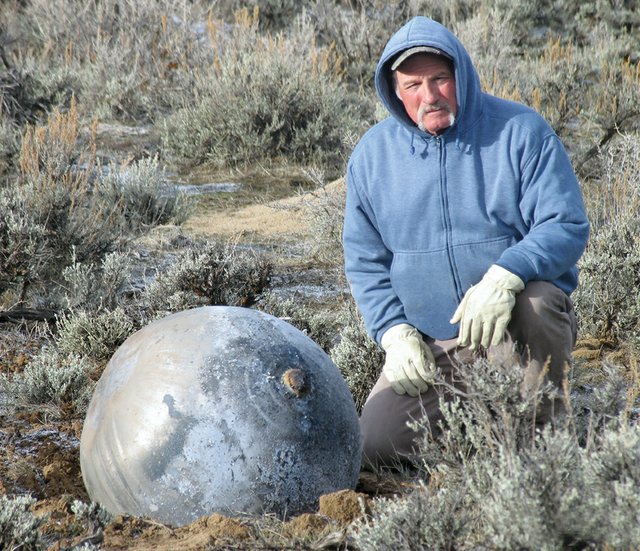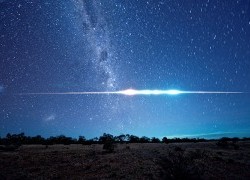Things falling from space have certainly caught our collective interest in the last few days. And while it’s been the extraordinary meteors in recent days, manmade items tumble from the sky more often than you might imagine. These are expensive contraptions that sometimes have “sensitive” applications. So, as you might imagine, there is a legal framework outlining what states must do when something belonging to another state lands in their territory. Let’s walk through an example.

(Craig Daily Press)
In March 2011, a hiker discovered seventy-pound, thirty-inch diameter titanium tank in the northwest corner of Colorado. The hiker notified the Moffat County Sheriff who, in turn, notified NASA’s Orbital Debris program. NASA’s analysis determined that the tank was likely from a Russian booster rocket tested in January 2011. Fortunately, the tank stored helium, which is used to force fuel into the booster rocket’s engine, and consequently was harmless.
Here’s what should have happened:
As an initial matter, the Outer Space Treaty states that the launching state retains “jurisdiction and control” over space objects and their component parts regardless of whether they are in space or on Earth’s surface.[1] Therefore, it is best to regard this fallen object as the property of the Russian Federation.
First, the Rescue and Return Agreement (RRA) requires a contracting state to notify both the launching authority and the UN Secretary General when it has information regarding a fallen space object within its territory.[2] Because this component landed within the United States’ territorial jurisdiction, it is required to issue this notice. Conveniently, the canister was labeled and could be identified as Russian. Were the component unidentifiable, the Secretary General—through a list maintained by the Office of Outer Space Affairs—would publish the discovery.
The launching authority—loosely defined as the state or intergovernmental organization that is responsible for the launch[3]—may request that the component be returned. If requested, the United States is obligated to return the component using whatever steps it deems “practicable.” The treaty does not elaborate upon what “practicable” means. However, unlike the return of astronauts, a component need not be returned as quickly as possible. Presumably, this does not require the retrieving state to expend significant resources or divert maximal effort to collecting the space object.

(http://usuaris.tinet.org/)
Returning the space object is predicated on the launching authority requesting the return of the space object; if the launching authority does not request its return, contracting states are not required to do anything. The United States, for example, always requests the return of fallen space objects or their component parts. Other states may not be as diligent.
Imagine if this tank were rather larger or somehow hazardous. In that case, the retrieving state may request the assistance of the launching authority to collect the fallen space object.[4] Regardless, the launching authority is responsible to pay for expenses a state incurs complying with the RRA obligations.[5]
Moral of the story: if Russia wants the tank back, Russia gets the tank back.
Enough with the law—the point is, if you find a piece of space debris, you’d better tell someone. It might be quite dangerous, first of all. And you never know who might come looking for it.
So now you ask, “what do I do if I find a meteorite?” I say keep it.
Dan St. John is the Editor in Chief of The View From Above, a third year law student at Sturm, and the Founding President of DU’s Space Law Society.


